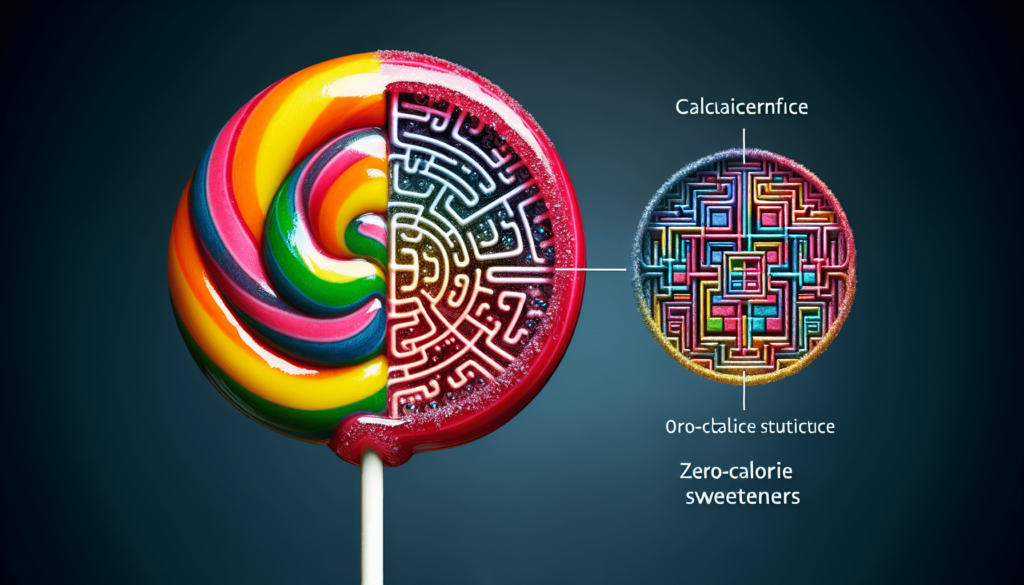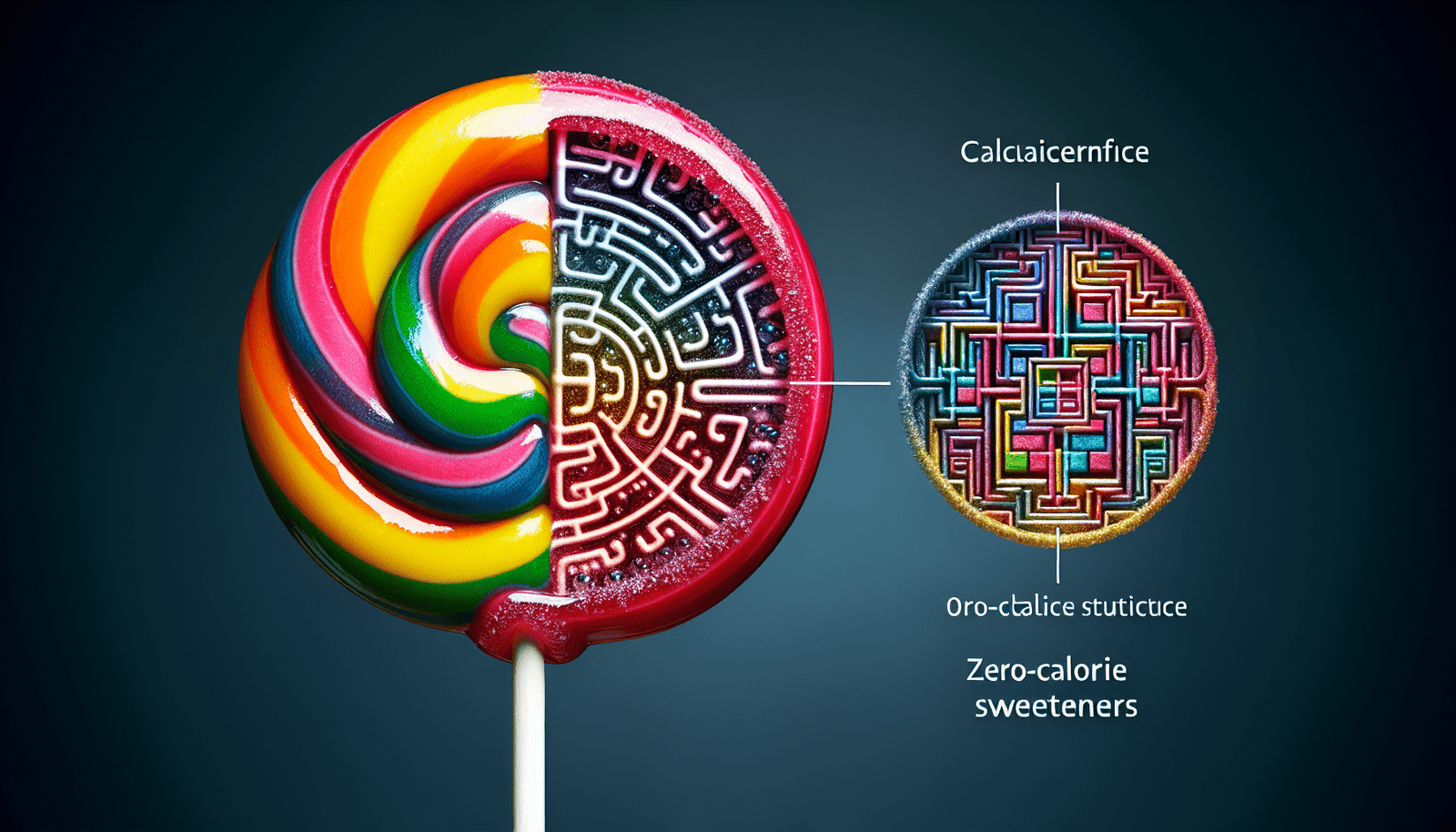Imagine being able to enjoy the sweetness of your favorite treats without worrying about the extra calories. Sounds too good to be true, right? Well, prepare to have your mind blown as we uncover the truth about zero-calorie sweeteners. In this eye-opening article, we will explore the science behind these sugar substitutes and examine their impact on our health. Brace yourself for a journey into the realm of sweetness, where taste meets calorie-free bliss.

What are zero-calorie sweeteners?
Definition and types of zero-calorie sweeteners
Zero-calorie sweeteners, also known as sugar substitutes or artificial sweeteners, are ingredients used in food and beverages to provide sweetness without adding any calories. These sweeteners are highly popular among individuals who are looking to reduce their calorie intake or manage their weight while still enjoying sweet flavors. There are several different types of zero-calorie sweeteners available on the market, including:
-
Aspartame: Aspartame is one of the most commonly used zero-calorie sweeteners. It is approximately 200 times sweeter than sugar and is often used in sugar-free soft drinks, desserts, and chewing gums.
-
Sucralose: Sucralose is another widely used artificial sweetener. It is derived from sugar and is approximately 600 times sweeter than sugar. Sucralose is heat-stable, making it suitable for baking and cooking purposes. It can be found in various food products such as sodas, baked goods, and dairy products.
-
Stevia: Stevia is a natural sweetener extracted from the leaves of the Stevia rebaudiana plant. It has zero calories and is much sweeter than sugar, with some estimates placing its sweetness level at 200 to 400 times that of sugar. Stevia is commonly used in tabletop sweeteners, beverages, and processed foods labeled as “reduced sugar” or “sugar-free.”
-
Saccharin: Saccharin has been used as a sweetener for over a century. It is approximately 300 to 500 times sweeter than sugar and is often used in diet soft drinks, tabletop sweeteners, and various other food products.
These are just a few examples of zero-calorie sweeteners available in the market. Each sweetener has its unique properties, including different levels of sweetness, taste profiles, and suitable applications in various food and beverage products.
How do zero-calorie sweeteners affect weight?
Potential for weight loss
Zero-calorie sweeteners are often regarded as a potential tool for weight loss due to their ability to provide sweetness without adding significant calories to the diet. By substituting sugar with zero-calorie alternatives, individuals can reduce their overall calorie intake and potentially create a calorie deficit, which is essential for weight loss.
Using zero-calorie sweeteners in place of sugar can be particularly beneficial for individuals who struggle to control their sweet tooth, as it allows them to enjoy sweet flavors while minimizing calorie consumption. This can be helpful when trying to reduce overall calorie intake and manage weight.
Indirect effects on weight
While zero-calorie sweeteners themselves do not contribute to weight gain, some studies suggest that they may indirectly affect weight through various mechanisms. For example, research has shown that consuming artificial sweeteners may influence hunger and satiety cues, potentially leading to increased food intake and overeating.
Additionally, some studies have found a correlation between the consumption of zero-calorie sweeteners and increased body weight or body mass index (BMI). However, it is important to note that these studies do not prove causation, and other factors, such as lifestyle choices and overall dietary patterns, may contribute to these associations.
Misconceptions about zero-calorie sweeteners and weight gain
There is a common misconception that zero-calorie sweeteners can lead to weight gain. However, scientific evidence does not support this claim. Zero-calorie sweeteners themselves do not provide any calories, and weight gain occurs when there is a caloric surplus in the diet.
It is important to remember that although zero-calorie sweeteners can be part of a balanced and calorie-controlled diet, they should not be seen as a magic bullet for weight loss or a license to consume unlimited quantities of sweet foods. A well-rounded approach to nutrition, including portion control and a variety of nutrient-dense foods, is essential for overall health and weight management.
Are zero-calorie sweeteners safe?
Safety evaluations and regulations
Zero-calorie sweeteners undergo rigorous safety evaluations before they are approved for use by regulatory authorities such as the U.S. Food and Drug Administration (FDA) and the European Food Safety Authority (EFSA). These evaluations assess the potential risks and provide guidelines for safe usage levels for each sweetener.
The safety evaluations include assessing factors such as acute toxicity, carcinogenicity, reproductive and developmental toxicity, and overall safety for human consumption. Based on extensive scientific research, these regulatory agencies have deemed approved zero-calorie sweeteners to be safe for consumption within specified daily intake limits.
Possible side effects and allergic reactions
While zero-calorie sweeteners are generally considered safe, some individuals may experience side effects or allergic reactions. Common side effects include gastrointestinal issues such as bloating, gas, or diarrhea. These symptoms are usually mild and temporary, and most people can tolerate zero-calorie sweeteners without problems.
However, some individuals may have allergic reactions or sensitivities to specific sweeteners. It is important to read labels carefully and be aware of any personal sensitivities or allergies. If any adverse reactions occur after consuming zero-calorie sweeteners, it is advisable to consult a healthcare professional for guidance.
Do zero-calorie sweeteners impact blood sugar levels?
Effects on blood sugar levels
One of the key advantages of zero-calorie sweeteners is their negligible impact on blood sugar levels. Since they do not contain carbohydrates or sugars that are rapidly absorbed and metabolized by the body, zero-calorie sweeteners are considered safe for individuals with diabetes or those who are concerned about blood sugar control.
By replacing sugar with zero-calorie sweeteners, individuals can still enjoy sweet flavors without experiencing the typical rise in blood glucose levels associated with sugar consumption. This can be particularly beneficial for people with diabetes who need to monitor their blood sugar levels closely.
Suitability for diabetes management
For individuals with diabetes, zero-calorie sweeteners can be a valuable tool for managing blood sugar levels and reducing total calorie intake. By swapping out sugar for zero-calorie alternatives, individuals can satisfy their sweet cravings while keeping their blood glucose levels stable.
However, it is important to note that individual responses to zero-calorie sweeteners may vary. Some people with diabetes may find that certain sweeteners, such as sugar alcohols like erythritol or xylitol, have a minimal impact on their blood sugar, while others may still experience slight increases. Monitoring blood sugar levels and consulting a healthcare professional or a registered dietitian can help determine the most suitable sweetener options for diabetes management.

Are zero-calorie sweeteners addictive?
Discussion on addiction potential
There is ongoing debate regarding the addiction potential of zero-calorie sweeteners. Some argue that the intense sweetness of these sugar substitutes can create cravings and dependence, leading to increased consumption and potential overeating.
However, scientific evidence on the addictive properties of zero-calorie sweeteners is limited and inconclusive. While these sweeteners may be highly palatable, addiction involves complex psychological, physiological, and behavioral factors that extend beyond just the desire for sweet taste.
It is important to note that individual susceptibility and relationship with food can vary greatly. Some individuals may find they have a heightened desire for sweetness regardless of the type of sweetener used, while others may not experience any addictive tendencies. Developing a balanced and mindful approach to eating, where cravings are addressed in a healthy and moderate manner, is key to maintaining overall well-being.
Can zero-calorie sweeteners increase cravings?
Evidence on cravings and appetite regulation
The impact of zero-calorie sweeteners on cravings and appetite regulation is a topic of interest and ongoing research. Some studies suggest that the intense sweetness of these sugar substitutes can trigger cravings for sweet foods and potentially lead to overconsumption.
However, the evidence in this area is not yet conclusive, and findings from various studies have been mixed. Some studies even indicate that zero-calorie sweeteners may have the opposite effect and help reduce cravings by satisfying the desire for sweetness without contributing to caloric intake.
It is worth noting that individual responses to zero-calorie sweeteners can differ. Some individuals may find that using zero-calorie sweeteners helps them manage their cravings and adhere to a healthy eating plan, while others may find that it increases their desire for sweet foods. Being mindful of personal cravings and making conscious choices based on individual needs and preferences is essential for overall dietary balance.
Do zero-calorie sweeteners have an impact on gut health?
Research on gut microbiota
The effect of zero-calorie sweeteners on gut health, particularly the gut microbiota, is an area of emerging research. The gut microbiota plays a crucial role in digestion, nutrient absorption, and overall health.
Preliminary studies suggest that certain sweeteners, such as saccharin, sucralose, and aspartame, may have some impact on the composition and diversity of gut bacteria. However, the extent of this impact and its implications on human health are still not well understood.
It is important to note that research in this area is ongoing, and more studies are needed to fully understand the potential effects of zero-calorie sweeteners on gut health. In the meantime, maintaining a balanced and varied diet that includes a wide range of fiber-rich foods to support a healthy gut microbiota is recommended.
Effects on digestion and nutrient absorption
Zero-calorie sweeteners generally do not have direct effects on digestion and nutrient absorption. Unlike sugar, which is broken down into glucose and absorbed by the body, zero-calorie sweeteners are typically not digested or metabolized.
These sweeteners pass through the digestive system without contributing calories or significantly affecting nutrient absorption. However, if consumed in excessive amounts, some individuals may experience gastrointestinal discomfort or laxative effects due to the non-digestible nature of certain sweeteners like sugar alcohols.
It is important to moderate consumption and be aware of personal tolerance levels to avoid any potential gastrointestinal issues.
Does long-term use of zero-calorie sweeteners have any health risks?
Studies on long-term effects
Long-term studies on the health effects of zero-calorie sweeteners are limited but growing. While these sweeteners have been approved as safe for consumption in regulated quantities, more extensive research is needed to fully understand the potential long-term impacts on human health.
Some studies suggest possible associations between zero-calorie sweeteners and metabolic disorders, such as obesity, type 2 diabetes, and cardiovascular disease. However, it is important to note that these associations do not prove causation, as various lifestyle and dietary factors can influence these outcomes.
Researchers continue to investigate the long-term effects of zero-calorie sweeteners to provide a more comprehensive understanding of their impact on health.
Potential link to metabolic disorders and cardiovascular health
As mentioned earlier, some studies have reported associations between zero-calorie sweeteners and metabolic disorders such as obesity and type 2 diabetes. However, the evidence is inconsistent, and more research is needed to establish a clear causal relationship.
It is worth noting that these associations could be influenced by factors such as overall dietary patterns, lifestyle choices, and individual predispositions. Consumers should consider a well-balanced approach to nutrition, focusing on a variety of whole, unprocessed foods, and avoiding excessive consumption of any single ingredient or food group.
Are zero-calorie sweeteners suitable for everyone?
Considerations for pregnant women
When it comes to zero-calorie sweetener usage during pregnancy, it is generally recommended that pregnant women consult with their healthcare provider for personalized guidance. While many zero-calorie sweeteners have been deemed safe for consumption within specified daily intake limits, some individuals may prefer to exercise caution during pregnancy.
Due to the limited research available on pregnancy-specific effects, it is best for pregnant women to discuss any concerns or questions regarding zero-calorie sweetener usage with their healthcare provider, who can provide appropriate guidance based on the individual’s health status and needs.
Appropriate usage for children
The usage of zero-calorie sweeteners in children is a topic of debate. While some regulatory agencies have approved certain sweeteners for use in children, it is generally recommended to limit the consumption of artificially sweetened products in children.
Children develop taste preferences over time, and exposure to intensely sweet flavors at an early age could potentially affect their perception of taste and preference for naturally sweet foods. Encouraging a diet rich in whole foods and limiting the consumption of highly processed foods and sweetened beverages, regardless of the sweetener used, is recommended for children’s overall health and well-being.
How do zero-calorie sweeteners compare to sugar?
Nutritional differences
Zero-calorie sweeteners and sugar differ in their nutritional profiles. While sugar provides calories and carbohydrates, zero-calorie sweeteners provide sweetness without adding significant calories or increasing blood sugar levels.
However, it is important to note that zero-calorie sweeteners do not provide any nutritional benefits in terms of essential vitamins, minerals, or other nutrients found in whole foods. Sugar, on the other hand, contains carbohydrates that can be used for energy and is present naturally in some foods, such as fruits and dairy products.
Taste and culinary uses
Zero-calorie sweeteners are often used as sugar substitutes in a wide range of culinary applications. They allow individuals to enjoy sweet flavors while reducing their overall caloric intake. However, it is worth mentioning that zero-calorie sweeteners may not always provide the exact taste and texture as sugar.
Each sweetener has its unique taste profile, which may differ from sugar. Some sweeteners, such as stevia, may have a slight aftertaste or different sweetness intensity compared to sugar. Experimenting with different sweeteners and finding the ones that best suit individual preferences and culinary needs can help achieve desired taste outcomes.
In conclusion, zero-calorie sweeteners offer individuals an option to satisfy their sweet cravings without significantly increasing their calorie intake. They can be a useful tool for weight management, blood sugar control, and overall calorie reduction. While there are ongoing discussions and research about their potential effects on various aspects of health, current scientific evidence suggests that zero-calorie sweeteners can be safely incorporated into a balanced diet. As with any food or ingredient, moderation and personal preferences should guide their usage.

